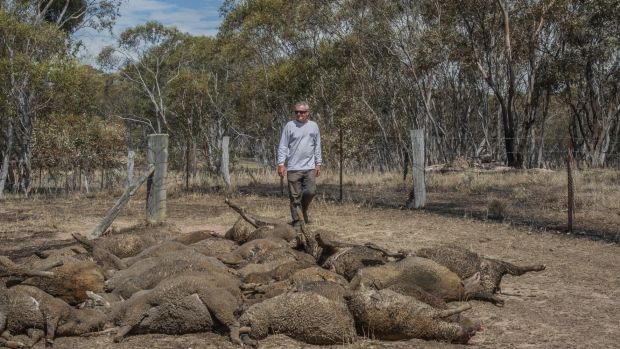Across the Bungendore region on Wednesday, locals surveyed the aftermath of the fast moving fire which had burned up 3300 hectares, tearing east towards Goulburn Rd.
On Wednesday, heavy winds, high temperatures and spotfires made efforts to battle the erratic blaze more difficult with a fire springing up west of Lake George, as an emergency warning was announced in Sutton.

Fred Kuhn, the past owner of Canberra's first surf & skate shop, Surf Scene, stood by a pile of his dead livestock on his property in Mt Fairy with his friend Tina Calisto.
He'd lost 43 of the 150 sheep he owned on Tuesday as the fire burned through his pine forest, and he was still thinking about what happened.
"I'm in denial," Mr Kuhn said, delaying burying the sheep vets had put down earlier that day, he said neighbours had shot seven sheep they'd spotted dying along the nearby road.
Mr Kuhn wasn't the only unlucky one, floating through The Loaded Dog pub in nearby Tarago were unconfirmed reports of hundreds of dead stock across the region, with one owner losing 200 sheep in Lower Boro.
"It is very sad, isn't it," Mr Kuhn said, looking at a pile of the dead livestock, some with burned mouths, burned feet or bodies burned so badly their organs had come out, each marked with a bloody hole on their forehead where vets had put them of their misery.
"Today is a much worser day than it was yesterday," Mr Kuhn said, describing the high winds and heat.

From his house he'd watched the winds pick up and carry the fire towards his home, which had avoided the damage, but most of his paddocks were gone.
He'd just come from a chat with his neighbour's David Rouse down the road, with Mr Rouse, his wife Pauline and their daughter Cassie Fry all singing the praises of the volunteer firefighters working through the night as the fire had narrowly dodged their home.

From his property on Tuesday, Mr Rouse had been watching the efforts of firefighters and water bombing aircraft before he saw his neighbour Richard Graham's log cabin explode.
"All of a sudden there was this black smoke," Mr Rouse said.

Earlier Wednesday morning, builder Scott Williams stood amongst the wreckage of the home he'd helped Mr Graham renovate for almost $150,000.
He, two other farm hands, and firefighters had tried to stop the fire but could only watch as the property off Hazeldell Rd was engulfed.
"It came roaring across the paddock in a matter of of minutes," Mr Williams said, overlooking the shell of the structure as fire crews and other locals moved around putting out spot fires.
Only the chimney stack stood tall, with the corrugate iron roof lying in pieces around the shell of the log cabin.
As it moved across the paddock it caught a few sheep, then caught a line of trees close to the home.
"Once it caught the trees, it was gone in a matter of minutes," Mr Williams said.
"Hell, it's hard to describe, it's the sort of thing you see on TV and you think 'Oh geez, these poor buggers,' and then when it happens to someone here that you know."
"There wasn't much anyone could have done," Mr Williams said, the fire had taken family and historical memorabilia that would never be replaced.
Down the hill, the cattle had survived, with two fighting on top of the scorched earth as a helicopter battling the front dropped low to take water from the dam.
Earlier in the day, on Mulloon Creek Natural Farms, south west of Mr Graham's, farm owner Tony Coote and associate Gary Nairn surveyed the damage to their farm with manager Michael Fitzgerald.
"I think we were very fortunate," Mr Fitzgerald said, he was feeling relieved after they feared the paddock with their 20,000 chickens had burned up.
"[The] wind was blowing to the north before it swung back around and flew back towards us."
It had come close. Out from the homestead, the three expressed amazement at the scorched earth which showed how the fire had circled the chicken sheds before burning out.
One chicken could be seen barely breathing, Mr Fitzgerald later walked out from behind a shed after killing it.
Six chickens, out of the 20,000 roaming free range across the farm, had died and the rest hid singed in the shade. The farm's dogs, in charge of looking after the chickens from foxes, had refused to leave them and still barked at anyone approaching.
"Oh we're so lucky," Mr Coote said. "It's just like a miracle."


